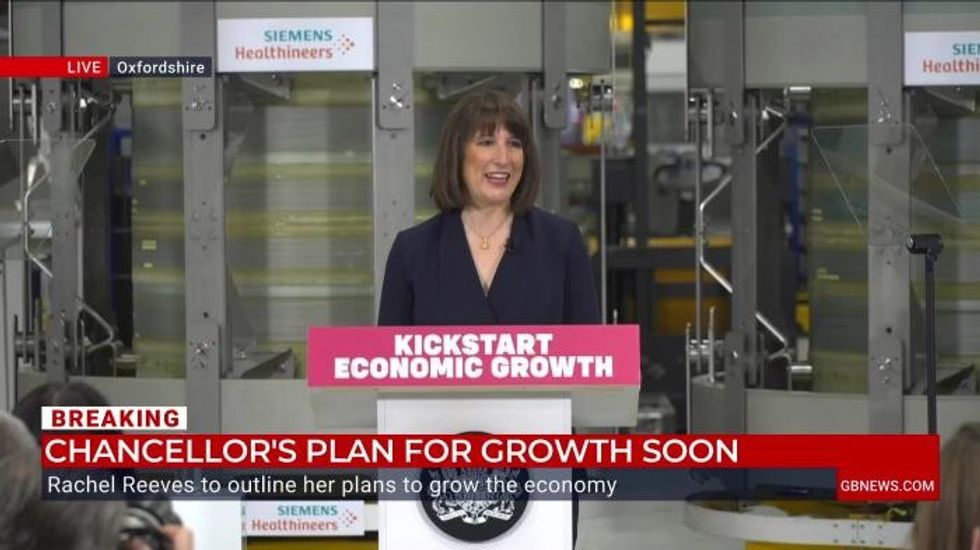UK economy at risk as Reeves faces £8bn hole in public finances after OBR's bullish forecasts under fire
The challenge comes as Rachel Reeves prepares to address the UK's budget deficit in March
Don't Miss
Most Read
Trending on GB News
Chancellor Rachel Reeves faces the prospect of deeper spending cuts as economists question the Office for Budget Responsibility's optimistic productivity forecasts.
A reduction of just 0.1 percentage point in the OBR's potential productivity growth forecast would create a £7billion-£8billion hole in public finances, according to Citigroup's UK economist Ben Nabarro.
The OBR's prediction of a sustained productivity rebound is "starting to look insane" amid sluggish economic performance, warns Andrew Wishart, economist at Berenberg Bank.
The OBR currently expects potential productivity growth to reach 1.2 per cent in 2029, representing the strongest sustained spell of productivity growth since before the 2008-09 financial crisis.
David Miles, an economics professor on the OBR's committee, has called higher productivity "the almost pain-free route to fiscal sustainability".
However, recent data paints a bleaker picture. Labour productivity shrank by 2.4 per cent in the third quarter of 2024 from a year earlier, according to official data.

The OBR has already been forced to reduce its estimates as data continues to disappoint
PA / GETTYThis contrasts sharply with the US, where business labour productivity rose by 2.1 per cent annually in the three months to September.
The OBR's October outlook predicted labour productivity would rise by one per cent or above for five consecutive years from 2025, a feat not achieved since before the financial crisis.
Matt Swannell, chief economic adviser to the EY Item Club, said while productivity growth could outperform pre-pandemic levels, it was "perhaps overly optimistic to think that productivity growth will reach more than one per cent per year on a sustained basis".
Andrew Bailey, Bank of England governor noted recent data revisions showed faster UK population growth, meaning "we can only conclude mathematically that productivity has got much worse".
LATEST DEVELOPMENTS:
Speaking to MPs in March 2024, Miles admitted the watchdog was a "bit more optimistic on productivity" than the Bank of England, describing their predictions as "no more than an educated guess, and maybe not even terribly educated".
In a recent interview with Imperial College London's magazine, Miles suggested the poor economic performance could be due to an "unlucky run of blips" including the financial crisis, pandemic, and Ukraine war.
The Bank of England's outlook stands in stark contrast to the OBR's predictions, estimating potential productivity growth of just 0.7 per cent in 2027.
The OBR has already been forced to reduce its estimates as data continues to disappoint, having previously assumed post-financial crash productivity would rebound to pre-crisis rates of more than two per cent annually.
Nabarro said: "The OBR are currently out on a limb when it comes to their productivity assumption compared to both recent performance and other macro forecasters, including the Bank of England."
Brexit trade frictions and reduced business investment are among key factors weighing on UK productivity prospects, according to Tomasz Wieladek, chief European economist at T Rowe Price.
A sustained period of weak public investment has also damaged the country's potential, Wieladek added.
Nabarro pointed to additional hurdles including poor business dynamism and a slowdown in investment in intangible assets.
 Chancellor Rachel Reeves begins to outline her plans to grow the economy.GBNEWS
Chancellor Rachel Reeves begins to outline her plans to grow the economy.GBNEWSWieladek added: "All of these factors together mean that productivity growth in the UK will likely stay lower than the OBR assumes."
A revision in the OBR's outlook later this year looks "more likely than not," warns Nabarro.
If the fiscal watchdog moves closer to the Bank of England's productivity assumptions, it could mean an additional hit to public finances of £12billon-£14billion.
"The prevailing view in the market when it comes to potential growth is materially weaker than the OBR's current assessment," Nabarro said.
The OBR, which is preparing its latest forecasts ahead of Reeves' fiscal statement on March 26, declined to comment.







